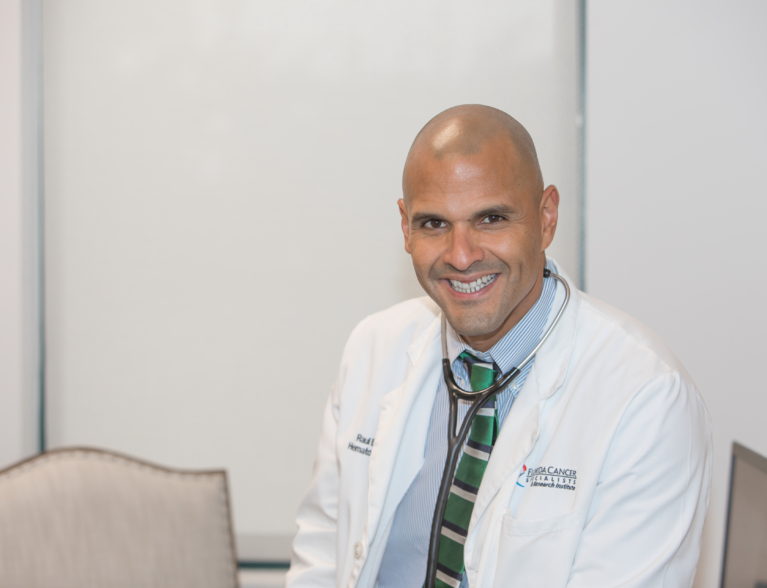
The Internet can be a dangerous place for cancer patients.
Even though medically approved and legitimate “cancer treatments and therapies today are safer and more effective than ever,” according to Memorial Sloan Kettering Cancer Center, there’s still a burgeoning business in “alternative” cancer treatments being touted and sold online.
That makes the usually genial and optimistic oncology and hematology expert Dr. Raul Storey of Florida Cancer Specialists turn downright somber.
“There’s just so much out there,” Storey says with a sigh, “and the problem with the marketing on the Internet is that everybody can say whatever they want and it doesn’t have to be data-supported.”
Specifically, he points to certain root- and herbal-based products sold online. “For an example, if you’re taking chemotherapy and then you start taking a plant or a root or something, remember that everything in our body gets metabolized in the liver or the kidneys.
“When you start taking a root that keeps the liver and the kidneys busy working on eliminating and excreting that root [and its chemical compounds], then the chemotherapy drugs you’re getting will remain in your body even longer and that increases the chances of you having side effects.”
Despite that and other dangers – since the National Cancer Institute projects an estimated 1.7 million new cases of cancer will be diagnosed in the U.S. this year, while 609,640 Americans will die from the disease – there’s an ever-growing market for non-conventional cancer cures.
And while NCI and Storey stop short of calling these online treatments pure quackery, they do break them down as being either “complimentary” or “alternative.”
Storey – and the Mayo Clinic – actively embrace a number of “complimentary” treatments.
In fact, the Rochester, Minn., institution has published a list of 10 such complimentary treatments including acupuncture, aromatherapy, hypnosis, massage, meditation and music therapy for which, it says, “there is growing evidence” they provide tangible benefits to patients.
Storey wholeheartedly agrees. He cites the American Society of Clinical Oncology in saying acupuncture – in conjunction with modern Western medical treatment – can help decrease anxiety, help with depression and assist in recovery, and he says he’s also seen positive results from yoga, Tai chi and meditation in his own patients.
That said, a patient who chooses some of the “alternative” cancer treatments available online may have an altogether different prognosis.
Perhaps the most infamous alternative cancer “cure” ever was Laetrile.
First touted as a remedy for cancer in the 1950s, Laetrile is made from amygdalin, a compound found in apricot pits and bitter almonds. And as any Agatha Christie fan likely knows, when your digestive system begins to break down amygdalin it creates cyanide – the deadly poison featured in a half-dozen of Christie’s murder mysteries.
Laetrile has been banned in the U.S. since 1963 but has since re-emerged on the Web where it can be purchased under the pseudonym “Vitamin B-17.”
In September, the FDA announced that a U.S. District judge in Miami had issued a preliminary injunction halting sales of laetrile products by three Internet sites, including World Without Cancer Inc. and Health World International Inc., of Bay Harbor, Fla., about 135 miles south of Vero Beach.
Other alternative cancer treatments sold online include hydrochloric acid, wormwood, so-called “medicinal mushrooms” and coffee enemas.
That causes Storey to let out a laugh. “There’s no evidence and no data to support any benefit from a coffee enema in oncology,” he says, let alone the other products listed above.
Storey says he understands why people are curious about possible alternative treatments, but he does have one suggestion: Talk to your doctor first.
“Before spending your money on any alternative approach to cancer,” Storey says, “see what he or she thinks. I’m not going to get mad at you for asking about other forms of treatment. I want the best for you.”
Storey freely admits, “I don’t know about plants. I haven’t been trained in plants,” but what he says he can and will do – with the help of the Florida Cancer Specialists team at over 100 locations statewide that includes pharmacists, doctors, nurses and researchers – is to find out if those so-called miracle cures have any dangerous – or even lethal – side effects.
That’s information well worth having before you start taking anything purchased online to treat your cancer.
Dr. Raul Storey is with Florida Cancer Specialists. In Vero Beach his office is at 3730 7th Terrace, Suite 101. The phone number is 772-581-0528.



